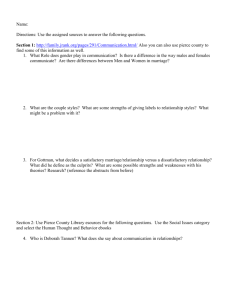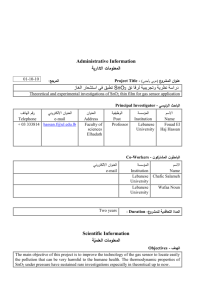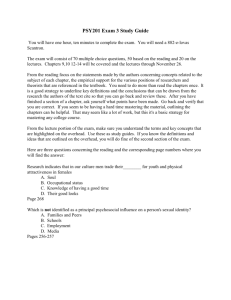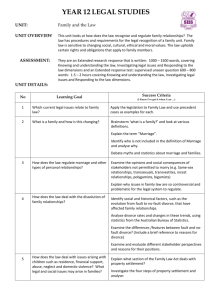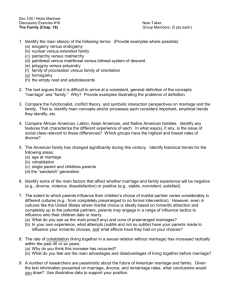Wu_Psch_380_fall_12
advertisement
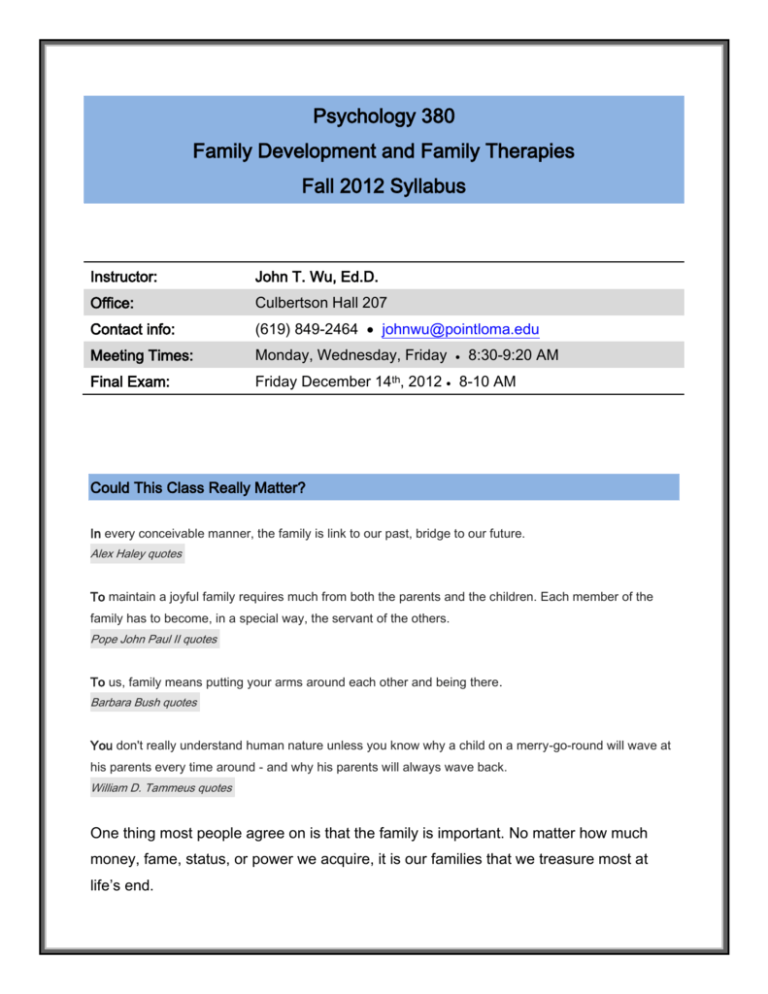
Psychology 380 Family Development and Family Therapies Fall 2012 Syllabus Instructor: John T. Wu, Ed.D. Office: Culbertson Hall 207 Contact info: (619) 849-2464 johnwu@pointloma.edu Meeting Times: Monday, Wednesday, Friday Final Exam: Friday December 14th, 2012 8-10 AM 8:30-9:20 AM Could This Class Really Matter? In every conceivable manner, the family is link to our past, bridge to our future. Alex Haley quotes To maintain a joyful family requires much from both the parents and the children. Each member of the family has to become, in a special way, the servant of the others. Pope John Paul II quotes To us, family means putting your arms around each other and being there. Barbara Bush quotes You don't really understand human nature unless you know why a child on a merry-go-round will wave at his parents every time around - and why his parents will always wave back. William D. Tammeus quotes One thing most people agree on is that the family is important. No matter how much money, fame, status, or power we acquire, it is our families that we treasure most at life’s end. This class is designed to explore how healthy families operate, and how unhealthy families can get better. This class will show you the common mistakes people make that undermine their odds of having great families. This class will matter to you because it can give you a map to becoming better partners, spouses, and parents. Course Objectives: Expose students to theological ways of thinking about the family. Expose students to the importance of the family and impacts of divorce. Introduce the common theoretical orientations in family therapy. Introduce special topics such as substance abuse and child abuse. Expose students to community consultation models such as marriage education and pre-marital couple’s preparation. Increase students’ understanding of their own family dynamics. Expose students to “family” dynamics in creating group project presentations. Student Learning Outcomes: By the end of this course you will be able to… Describe seven family theories and their core concepts and techniques. Critique the impact of marriage, divorce, and cohabitation. Describe families from a theological perspective. Summarize marriage education in the areas of mate selection, premarital preparation, and divorce prevention. Compare concepts of family therapy to your own family. Predict possible impacts to your future family based on your own family analysis. These objectives will be achieved through your diligent study of the assigned readings, lectures given, videos shown, group presentations, and key written assignments. PSY380 Page | 2 SP12 Readings: Our course will use two books, one reader, and one recommended book: Nichols, M., and Schwartz, R. (2011). Essentials of Family Therapy, 5th Ed. Allyn and Bacon: Boston. Gottman, J. M. and Silver, N. (2000). The Seven Principles for Making Marriage Work: A Practical Guide from the Country's Foremost Relationship Expert. Supplemental readings accessed through Eclass and electronic reader. Recommended book : Yoyo Dad 2: Dating Well in an Up and Down World. (Search Amazon for “Wu Yoyo” ). Grading: The final grade will be based on a combination of five exams, one group presentation, one group project, two papers, and one final. Students may drop the lowest of the first five exams but must take the final. Points Exam 1 80 Exam 2 80 Exam 3 80 Exam 4 80 Exam 5 80 Genogram Project 35 Family Analysis Paper 55 Gottman Presentation (group) 35 Comprehensive Final Exam 120 Total 565 PSY380 Page | 3 My Score SP12 PSYCHOLOGY DEPARTMENT NORMAL CURVE GUIDES Z Score A 1.33 0.0918 9.2% A- 1 0.1587 6.7% B+ 0.67 0.2514 B 0.33 B- Percentage Score A= 93-100% A- 90-92% 9.3% B+ 88-89% 0.3707 11.9% B 84-87% 0 0.5 12.9% B- 80-83% C+ -0.33 0.6293 12.9% C+ 77-79% C -1 0.8413 21.2% C 70-76% C- -1.33 0.9082 6.7% C- 65-69% D+ -1.67 0.9525 4.4% D+ 62-64% D -2 0.9772 2.5% D 55-61% D- -2.33 0.9901 1.3% D- 50-54% F <-2.33 1 1.0% F 49% 15.9% 34.1% 40.8% 9.2% or below The student will receive the higher grade between Z Score and Percentage Score grade calculations. A minimum of 50% is needed to pass the course. Grades will be based on the Psychology departmental standards for upper division courses. The professor reserves the right to adjust the scale if needed. Students are expected to participate in discussions. In the event a student’s final grade is within three points of the next grade, classroom participation will be considered in assigning the final grade. All examinations except the final are non-comprehensive and will cover the text, lecture, and video material. The format of the examinations may consist of multiple choice, fill-in, short answer, and essay questions. The final is comprehensive. No make-up exams will be given without the prior approval of the instructor. If an exam is missed without an authorized excuse, that exam will be the dropped exam. Assignments: PSY380 Page | 4 SP12 There are two individual written assignments: a. The first written assignment is a detailed genogram of your family that extends at least three generations. This is worth 35 points. This project should have two sections. One section will show all family members in a genogram (and include important features such as marriage, separation, divorce, alcoholism, abuse, mental illness, etc.). On the genogram page, include a key that shows history of alcohol, mental illness, major health concerns, etc. Show this key even if your family does not have these issues so that it is clear you assessed the issues. A second section will show your immediate family and your parents and their parents in a structural chart (who is close to whom?). Please break the structural chart into pieces to show the specific relationships – not one large structural chart showing everyone at once. b. The second written assignment is the signature assignment of the course: a family/biography assessment. Using class lectures and readings, you will write an analysis of either your personal family (at least three generations) or another family you know extremely well. You may choose any theoretical orientation (or blend of orientations). 55 points / approximately 10 pages Analysis should include the following: 1. A brief overview of the theory used. 2. Information about the structure of the 8. Detail the lessons you’ve learned that you wish to bring into your future family. In other family (e.g., is it open, closed, which words: what must you remember to improve members are close or distant?). your odds of a great family? Based on your 3. Strengths and weaknesses. family analysis and your previous romantic 4. Family myths. patterns, what do you need to watch out for? 5. Gender and ethnicity rules. Ask someone who knows you well (not 6. Experiences with death. someone you are dating) what they think 7. If you could restructure something in you need to remember when you choose a this family, what would it be? PSY380 mate and build a family. Page | 5 SP12 The requirements are as follows: *Use 8 ½ by 11 paper, typewritten, on one side only. *Place the title and your name on the top of the first page. *Use double spacing and one inch margins. *All late papers lose 10% per week late; no papers will be accepted after the last day of classes. **Papers will be submitted electronically on Eclass. The genogram assignment will be turned in during class. Group project: a. In a “family” group, you will make one presentation 10-15 minutes long. This presentation will describe and illustrate the concepts in a Gottman chapter. Your goal is to convey the main ideas, not to convey every idea in the chapter You will be graded on creativity (use skits, video clips, PowerPoint, etc., anything to make it engaging), completeness, and cooperation (your “family” should interact with each other.) The presentation is worth 35 points (15 from me, 10 from your group members, and 10 from the class.) Do your best to make your presentation helpful and fun. Do not just take turns talking in front of a PowerPoint presentation. Academic Integrity and Behavioral Expectations: This class will be conducted in accordance with the college student code of conduct and basic standards of academic honesty. It goes without saying that any forms of cheating, plagiarism, or other forms of academic dishonesty are not acceptable and will severely impact your grade and any future letters of recommendation. Is it really worth it? Part of my job is to help create a positive learning community. If you repeatedly have a negative impact on that community, I reserve the right to lower your final grade by one PSY380 Page | 6 SP12 letter grade. Ultimately, everyone has to choose whether they will contribute or break down community, and I invite you to be a contributor. Attendance is a critical component of this course. Much of the learning comes from class discussion and material not covered in the book. That is why the PLNU attendance policy will be closely followed. Please note that only Provost approved, university-sponsored activities are excused and personal reasons such as illness or family events are not. Of course we all have personal reasons why missing class might be necessary, and so each student receives four personal absences. At the end of the semester, each unused absence will be converted into an extra credit point (yes, you can get four extra credit points simply by attending class each day.) Each unexcused absence or tardy beyond four will be minus three points. If absences are excessive, the student may be dropped from the class. Academic Accommodations: While all students are expected to meet the minimum academic standards for completion of this course as established by the instructor, students with disabilities may require academic accommodations. At Point Loma Nazarene University, students requesting academic accommodations must file documentation with the Disability Resource Center (DRC), located in the Bond Academic Center. Once a student files documentation, the Disability Resource Center will contact the student’s instructors and provide written recommendations for reasonable and appropriate accommodations to meet the individual needs of the student. This policy assists the university in its commitment to full compliance with Section 504 of the Rehabilitation Act of 1973, the PSY380 Page | 7 SP12 Americans with Disabilities (ADA) Act of 1990, and ADA Amendments Act of 2008, all of which prohibit discrimination against students with disabilities and guarantees all qualified students equal access to and benefits of PLNU programs and activities. Office Hours: Make appointments directly with the professor or see posted office hours on the office door. FERPA. In compliance with federal law, neither PLNU student ID nor social security number should be used in publically posted grades or returned sets of assignments without student written permission. This class will meet the federal requirements by distributing all grades and papers individually. Also in compliance with FERPA, you will be the only person given information about your progress in this class unless you have designated others to receive it in the “Information Release” section of the student portal. For more information on undergraduate policies, please go to http://catalog.pointloma.edu/content.php?catoid=8&navoid=864. Helpful Websites: The course syllabus and course readings are posted on Eclass: eclass.pointloma.edu Log in using your PLNU username and password. This site shows information on the marriage education movement; there are great articles and a description of their annual conference: www.smartmarriages.com Tips for psychology majors (including getting into graduate school): http://www.psychwww.com/index.html PSY380 Page | 8 SP12 Video resources on marriage: http://www.marriageuncensored.com/showGlobalE.php Catalog Description: Introduction to the normative stages and crises affecting families over the life span and to the major theories of family and marital psychotherapy. Emphasis on how various models work with relational systems to facilitate development through times of crisis and developmental transition. Also focuses on therapeutic issues of substance abuse and on legal issues involved in child, spousal, and elder abuse. Family developmental theories are applied to community organizations in order to assist students in understanding how system principles are used in community consultation. The professor reserves the right to change the syllabus at his discretion. PSY380 Page | 9 SP12
